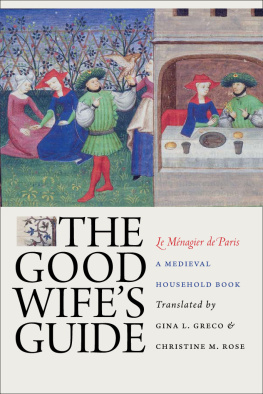Preface
This project began when Christine Rose decided to teach Le Mnagier de Paris in a Medieval Women class. She discovered that Eileen Powers 1928 Goodman of Paris translation was out of print and permission to photocopy it for the class could not be obtained. No alternative translation provided a substantial representative section of the book. When Gina Greco, a friend and a meticulous Old French scholar, agreed to collaborate on a scholarly English translation, it seemed incredibly fortuitous, and we began the long trek through the text. We feel especially qualified to partner in this undertaking and are blessed by how our training in palaeography and languages complement one another. It has been a most satisfactory collaboration in every way.
Impetus to finish the translation came from academic colleagues who heard Roses conference papers on Le Mnagier de Paris and inquired when a translation might appear, since they found it a crucial text for medieval studies. We appreciated and took seriously the comments and questions we received, especially from Polish colleagues at Adam Mickiewicz University in Poznan and Professors Jacek Fisiak, O.B.E., and Liliana Sikorska, who arranged two outstanding symposiums where Rose had the opportunity to discuss her research on the text. As the volume gradually took shape, the tasks were divided, with Greco as the primary translator of Middle French, and Rose in charge of the introduction, notes, and rendering the text into readable and interesting modern English. But there was indeed much crossover in our duties. We were not prepared to love the book as much as we did, and do, despite its darker aspects. While the last parts of the translation and introduction were refined, Greco was in Burkina Faso, Africa, on a Fulbright grant, and then in Angers, France, and the files flew through cyberspace between there and Seattle and Portland. While one translator slept, the other was probably working on Le Mnagier. Each version of our translation traveled back and forth multiple times for fine-tuning, astonishing us with the wonder and the ease of the partnership from opposite ends of the earth and with the wealth of electronic aids found at Portland State and the University of Washington libraries, as well as on the Worldwide Web.
We strove to make sure that the translation not stray from the exact sense of the Middle French. Correct readings of crucial terms cropped up in many and diverse places, including databases of medieval cookbooks and Old French dictionaries; French equestrian clubs; farmers markets in France; websites on cow anatomy, falconry, horse dentistry; books of penitential reading; and, of course, old-fashioned haunting of libraries. We consider this work as continuing and improving upon the efforts of those scholars who have explored this text over the years, its popularity long hampered by the lack of an English translation and still stalled by the fact that Baron Pichons edition remains the sole resource for three sizable sections of the text. From his edition in 1846, to Georgine E. Brereton and Janet M. Ferriers in 1981, to Brereton, Ferrier, and Karin Ueltschis in 1994, we had before us the various notes and choices for what a reading might be, many of which we rejected, but these were inestimable guides to getting it right, and we benefited from both correct and inexact readings. Our readers can fruitfully consult Brereton-Ferrier and Pichon for expanded explanatory notes to the text, most of which we did not reproduce here. The English translationsPowers and the few excerptspiecemeal as they are, helped us narrow down some issues, and the cookbook in particular, with its arcane terminology, was mightily aided by the number of reference books, recipe books, and websites on medieval cookery that abound, some of which included material from Le Mnagier. Studying manuscripts A and C in the Bibliothque Nationale in Paris was enormously valuable, although the work of Pichon and Brereton-Ferrier was generally accurate, and few questions about manuscript readings were not answered by their notes. We have every confidence in the faithfulness of our translation to the authors book. At times, we have given his narrator a more interesting vocabulary than the text provides, but we have remained true to the sense. Through our translation we endeavor to join a conversation that explores medieval female behavior and those writings that proscribed and prescribed how women (and men) were to conceptualize their place in society and their subjectivity, while attending to what the social and personal consequences of such a literature might be. We hope that the introduction will foster further study and enjoyment of this text by scholars and students, as well as situate the book in its cultural moment and milieu.
While the matter of the book may seem amusing or outrageous in its strictures against female freedom and its advocacy of absolute obedience to the husband, such a program of restraint of females is not a relic of some medieval past but forms part of the fabric of Western civilization and was a widespread ethos in the United States until recent times. (One might propose that female suffrage in the United States and Europe was one of the agents of change, but even since then, the belief in the rightness of female obedience has had its proponents.) Such a system, which, as Elizabeth Cady Stanton wrote in the 1848 Seneca Falls Declaration of Sentiments, involves a history of repeated injuries and usurpations on the part of man toward women, having in direct object the establishment of an absolute tyranny over her, continues to exist as the cultural norm of some sects, regimes, and regions. Though readers may find this antique French husband inconsequential as he consciously strains to advocate control of the behavior or reading of obstreperous medieval women, we must not allow our distance from this system to lull us into discounting its cultural power and gravity as an agenda of female oppression. Despite the fact that the authorized version of good female and wifely behavior in the Middle Ages was often at odds with the derelictions of the bad women displayed in stereotyped stories and probably in actual medieval life, the models for virtue in women were taken seriously, it seems. Such a system of control of women as we see in Le Mnagier had thenand has nowreal costs for women and society. Perhaps, along with the young wife, we might both love and fear such a man as the narrator, and the work he presents may elicit a complicated aesthetic response in the reader. In this book, for our consideration, reside both scary stuff and fun stuff: rules to follow (with threats of punishment, both present and in the hereafter) and work to do, but also useful tips, agreeable stories, and good things to eat. For ourselves, neither of us has attempted any of the feats of gastronomy mentioned herein, or taken to heart any of the advice on how to be good wives.
For their encouragement and affection, we thank first our parents, Beryl and Claude Greco, and Marjorie and Lloyd Rose, and our brothers and sisters in our own childhood mnages : Kenneth, Joseph, and Douglas Rose; Aime Schafer, Matthew, Marc, and Stephen Greco. Our husbands, Gaetano DeLeonibus and John Coldewey, to whom we dedicate this volume, were always positive and wise about our work, while Elena and Sophia DeLeonibus and Christopher and Devin Coldewey tolerated our scholarly projects woven into their childhoods, yet have survived splendidly. We love them all. So many teachers and colleagues have been our models, inspirations, and supporters, and we are in their debt. This book could not have come to pass without the intellectual generosity, inspiration, and friendship of Sheila Delany, to whom Christine Rose owes a profound debt of gratitude. Likewise, Gina Greco could not have spent as much time with the manuscripts without the unstinting hospitality and friendship of Hana Rottman throughout the years. We thank also from our past education, and gratefully count among our present (and departed) friends and mentors:(CR) F. Donald Logan, Charles Lionel Regan, Peter Carafiol, Paul G. Remley, John M. Ganim, Ralph Hanna III, Laurie A. Finke, Paul Giles, G. Robert Stange, Sylvan Barnet, John M. Fyler, Georgia Ronan Crampton, Sister Anne Cyril Delaney, A. S .G. Edwards, Michel-Andr Boissy, Raymond Biggar, C. Warren Hollister, Elizabeth A. Robertson, Larry D. Benson, Harriet Spiegel, Charlene Rogers, Christine Thompson, Linda Dow Ferguson, Diane Carmody Wynne, andmost of allEileen D. Hardy, the best of friends; (GG) Karl D. Uitti, Carleton Carroll, Sandra Rosengrant, Sylvie Rottman, Karen Carr, Elisabeth Jacquier, Rhonda Case, Gretta Siegel, Debora Schwartz, Laura Zinker, Peter DeLeonibus, and for their assistanceso vital to the completion of the projectBeverly Mangold and Wendy de Charnac. Thanks to our astute copyeditor Susan Tarcov, to Karen Popp for cheering us on, to our editor Teresa Jesionowski, and to Peter Potter, Editor-in-Chief of Cornell University Press, for his faith in the enterprise.














